The Memoirs of Catherine the Great (26 page)

Grand Duchess Ekaterina Alekseevna
and Grand Duke Peter Fedorovich
(1744 – 45).
GEORG CHRISTOPH GROOTH
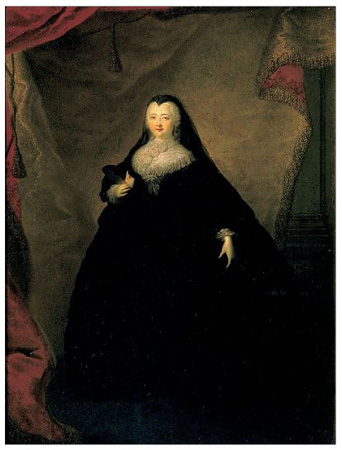
Empress Elizabeth in a
black masquerade domino
with a mask in her hand
(1748).
GEORG CHRISTOPH GROOTH
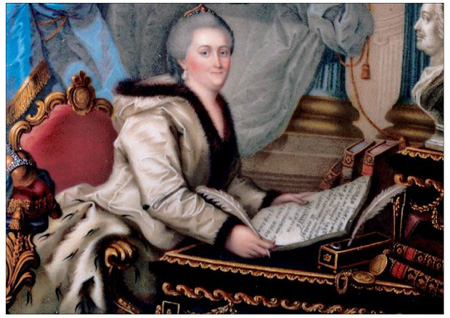
Catherine the Great holding her
Instruction
(1765–79).
Although she first wrote it in French (1765–67), the text is in Russian;
on the table are a bust of Peter the Great and books she consulted,
including Montesquieu’s
Spirit of the Laws
(1748);
an orb representing her power nestles in
the arm of the chair.
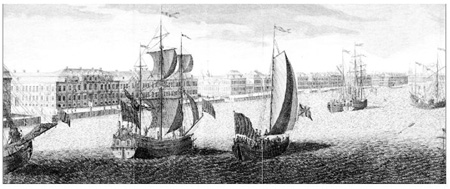
St. Petersburg and Neva River panorama (1753).
MIKHAIL IVANOVICH MAKHAEV
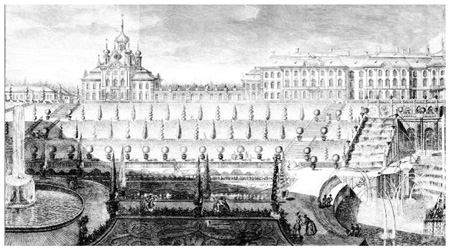
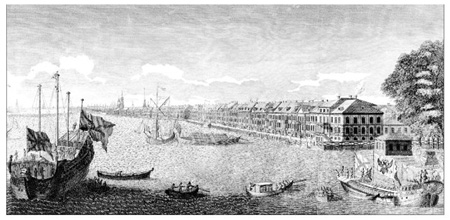
Peterhof and the Grand Cascade (1753), on the Gulf of Finland,
where Peter the Great originally had his summer palace.
MIKHAIL IVANOVICH MAKHAEV
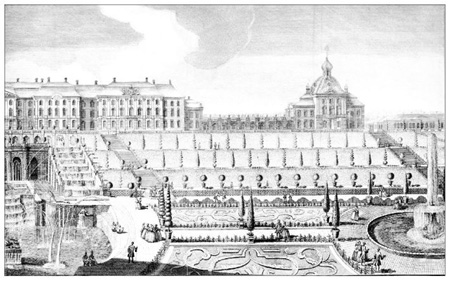
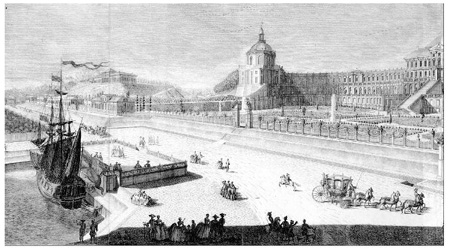
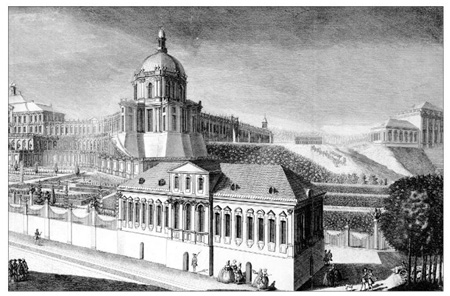
Oranienbaum (1753), home of Peter III and, later, Catherine the Great’s
summer residence; today called Lomonosov.
MIKHAIL IVANOVICH MAKHAEV
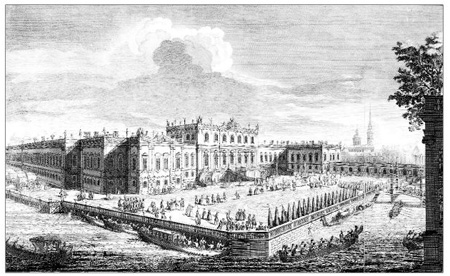
The Summer (or Catherine) Palace, Tsarskoe Selo (Czar’s Village):
View of Her Imperial Highness’s summer home from the north side (1753).
MIKHAIL IVANOVICH MAKHAEV
PART TWO
1751
Catherine’s views on negotiations over Holstein; Elizabeth’s
favorite; Lev Naryshkin; new furniture; boredom; Count
Chernyshev’s ardor for Catherine
At the beginning of 1751 the Grand Duke, who had taken Count de Bernis, Ambassador from the court of Vienna, into his affection as much as I had, decided to talk to him about his Holstein affairs, about the debts with which this land was burdened at the time, and about the negotiations initiated by Denmark, which he had authorized. He told me one day to speak about this with Count de Bernis too. I replied to him that if he ordered me to do it, I would. And indeed, at the next masked ball, I approached Count de Bernis, who stood near the balustrade beyond which there was dancing, and said that the Grand Duke had ordered me to speak to him about the affairs of Holstein. Count de Bernis listened to me with a great deal of interest and attention. I told him quite frankly that being young and devoid of counsel, as well as perhaps poorly understanding affairs of state, and having no experience to cite in my favor, my ideas were my own, that I might lack a great deal of knowledge, but that it seemed to me first of all that the affairs of Holstein were not as desperate as people wanted to make them seem. That moreover, as concerned the exchange itself, which I understood rather well, it might be more advantageous for Russia than for the Grand Duke personally, that assuredly as heir to the throne, the interests of the empire should be dear and precious to him. If for these interests it was absolutely necessary for the Grand Duke to give up Holstein in order to put an end to the interminable disputes with Denmark, then even if Holstein were kept for now, it would only be necessary to choose the right moment and the Grand Duke would consent to give it up. It seemed to me that now was not that moment, neither for the Grand Duke’s interests nor his personal glory, that a time or circumstance might come, however, that would render this act both more consequential and more glorious for him and perhaps even more advantageous for the Russian Empire. But at present, all of this had such a manifest air of intrigue about it that if it succeeded, it would make the Grand Duke appear so weak that he would perhaps never recover from it in public opinion. He had been managing the affairs of his country for only a few days, so to speak. He loved this country passionately, and despite this, they had succeeded in persuading him to exchange it, without him really knowing why, for Oldenburg, which he hardly knew and which was farther from Russia. Besides, in the hands of the Grand Duke, the port of Kiel alone could be important for Russian shipping. Count de Bernis considered all my arguments and in the end said, “As Ambassador, I have no instructions concerning all this, but as Count de Bernis, I think that you are right.” The Grand Duke said to me after this that the Imperial Ambassador told him, “All that I can say to you on this subject is that I believe that your wife is right, and that you will do very well to listen to her.” As a result, the Grand Duke cooled considerably toward these negotiations, which apparently was noticed and was why the matter was mentioned to him less often.
After Easter, we went as was customary to reside for a while in the Summer Palace, and from there to Peterhof.
85
The annual stays here began to get shorter. That year an event occurred that gave the courtiers something to gossip about. It was brought about by the intrigues of Messieurs Shuvalov. Things had reached the point that from one day to the next, everyone waited to see which of the two would cede his place to the other, that is, Beketov to Ivan Shuvalov or the latter to the former. Colonel Beketov, who was already mentioned above, out of boredom and not knowing what to do with the favor that he enjoyed, decided to have the Empress’s choir-boys sing at his residence. He developed a particular affection for several of them because of the beauty of their voices, and as he himself and his friend Elagin were versifiers, he wrote songs for them, which these children sang. This was given an odious interpretation; it was known that the Empress detested nothing more than this particular vice. With an innocent heart, Beketov walked with these children in the garden. This was imputed to him as a crime. The Empress departed for Tsarskoe Selo for a couple of days and then came back to Peterhof, and Monsieur Beketov, under the pretext of an illness, was ordered to stay there. He remained with Elagin, came down with a severe fever that he thought would kill him, and in his delirium he dreamed only of the Empress, with whom he was obsessed. He recovered, but he remained disgraced and withdrew from the court, after which he was placed in the army, where he had no success. He was too effeminate for the military profession.
Meanwhile we went to Oranienbaum, where we went hunting every day, and toward autumn, we returned to the city. In the month of September the Empress placed in our court Monsieur Lev Naryshkin as a gentleman of the bedchamber. He had only just returned from Moscow with his mother, brother, sister-in-law, and three sisters.
86
He was one of the most singular personages that I have known, and no one ever made me laugh as much as he. He was a born Harlequin, and if he had not been of noble birth, he could have made a living and acquired much with his real comic talent. He had no lack of wit, he had heard all the gossip, and he had a unique ability to keep everything in his head. He was capable of discoursing on any given art or science. He employed the technical terms of the subject and spoke continuously for a quarter hour or more, and at the end, neither he nor anyone could make anything of the stream of words that flowed from his mouth, and everyone just burst out laughing. Speaking of history, he said among other things that he did not at all like history in which there were tall tales, and that for history to be any good, it had to be devoid of such tales, and that anyway, history was becoming gibberish. But it was really on politics that he was inimitable. When he began to speak, even the humorless could not resist. He also said that most well-written comedies were boring. He had hardly arrived at court when the Empress ordered his elder sister to marry a Monsieur Seniavin, who was therefore placed in our court as a gentleman of the bedchamber. This was a serious blow to the young woman, who married this man only with the greatest revulsion. This marriage was very poorly received by the public, which placed all the blame on Monsieur Shuvalov, the Empress’s favorite. Before coming into favor, he had been quite fond of this young maiden, who was married off badly so that he would lose sight of her. This was a truly tyrannical form of persecution; eventually she married, became consumptive, and died.
87
At the end of September we returned to the Winter Palace.
88
At that time, the court had so little furniture that even the mirrors, beds, chairs, tables, and commodes that served us in the Winter Palace went with us to the Summer Palace and from there to Peterhof, and even followed us to Moscow. A good number broke and were damaged in these journeys, and they were given to us in this battered state, so that we had a hard time using them. As it was necessary to have an express order from the Empress to obtain others, and since most of the time access to her was difficult or even impossible, I resolved little by little to buy myself commodes, tables, and the most necessary furniture with my money for both the Winter and Summer Palaces, and when I went from one residence to the other, I found everything that I needed without the difficulty and the inconveniences of transport. This arrangement pleased the Grand Duke; he did the same for his apartment. At Oranienbaum, which belonged to the Grand Duke, we had everything we needed at our own expense. In my apartment there, I spent my own money to avoid all disagreement and difficulty because although His Imperial Highness spent freely on all his fancies, when it came to me, in general he was anything but generous. But since what I spent from my purse on my apartment served to embellish his house, he was very content.
That summer, Madame Choglokova developed a very particular affection for me that was so real that upon her return to the city, she could hardly do without me, and got bored when I was not with her. The basis for this affection was that I had not at all responded to that which it had pleased Monsieur her husband to show me, and this had given me a singular merit in the eyes of the wife. Back in the Winter Palace, Madame Choglokova invited me almost every afternoon to come to her apartment. Few people were there, but always more than in mine, where I would read all alone, except when the Grand Duke would pace my room in great strides and talk to me of things that interested him, but which were of no importance to me. These walks lasted one or two hours and were repeated several times a day. I had to walk with him until his strength gave out, I had to listen to him attentively, I had to respond. Most of the time I could make neither heads nor tails of his remarks, in which he often gave free rein to his imagination. I recall that he spent almost one whole winter occupied with plans to build a country house near Oranienbaum in the form of a Capuchin monastery, where he and I and his whole court would be dressed as Capuchins. He found this costume charming and comfortable. Each person was to have a donkey and take turns leading it to find water and bring provisions to the so-called monastery. He was overcome with laughter and joy over the wonderful and amusing effect that his creation would produce. He made me do a pencil sketch of the ground plan of this beautiful project, and every day I had to add or subtract something. As resolved as I was to be indulgent and patient with him, I frankly admit that I was very often overcome with boredom on these visits, walks, and conversations, which were of an insipidness that I have never seen equaled. When he left, the most boring book seemed a delicious amusement.
At the end of autumn, the court and public balls recommenced at court, as did the finery and the elegant outfits for the masked balls. Count Zakhar Chernyshev returned to Petersburg. As he was an old acquaintance, I always treated him very well. This time I was free to interpret his attentions as I pleased. He began by telling me that he found me much prettier. This was the first time in my life that someone had said such a thing to me. I did not find it displeasing. In fact, I had the goodness of heart to believe he was telling the truth. At each ball there was a new remark of this nature. One day Princess Gagarina brought me a sealed note on his behalf. Opening it, I noticed it had been opened and resealed. The note was printed as usual, but contained two very tender verses full of feeling. In the afternoon I had some notes brought to me, and I looked for one that would respond to his without compromising me. I found one, inserted it in an envelope shaped like an orange, and gave it to Princess Gagarina, who passed it on to Count Chernyshev. The following day, she gave me another one from him, but this time I found in it a note with a few lines in his hand. This time I responded personally. There we were in a regular and very sentimental correspondence. At the next masquerade, while dancing with me, he told me that he had a thousand things to say to me that he could not confide to paper nor place in a note that Princess Gagarina might open in her pocket or lose on the way. He begged me to grant him a brief audience in my room or wherever I judged appropriate. I told him that this was utterly impossible, that my chambers were inaccessible, nor could I leave them. He told me that he would disguise himself as a servant if necessary, but I firmly refused, and things went no further than this correspondence, stuffed in envelopes. Eventually Princess Gagarina realized what might come of this, scolded me for involving her, and no longer wanted to accept them. With these events, 1751 ended and 1752 began.